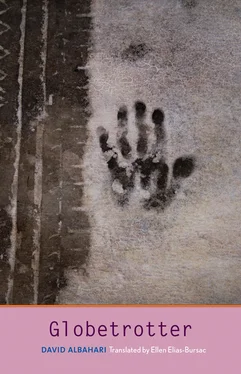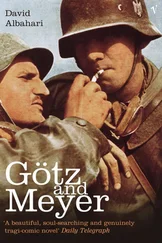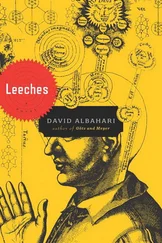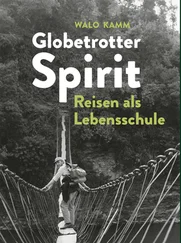In order to give voice to everything that was bothering him, said the grandson, he would have to start from the middle and move forward and backward in time, sometimes in space as well, though that shouldn’t worry him, said Daniel Atijas, as there are stories that can be told only that way. There are those, he said, that have to follow a linear sequence, in which what follows cannot be told before what precedes it, just as there are those, he said, which should be told backwards, starting from the end, though he always felt, he said, that the best are those which, like the grandson’s, start from the middle and then, a little like a tangled skein, resist anyone’s predictions about how they will unravel. We kept walking along the main street, on the stretch from Buffalo to Wolf, because this is where the restaurants were that we had been debating about. The grandson’s story had not begun until we stepped into The Coyote’s Den, though he had already been talking for nearly an hour. Two or three times till then we had stopped so that they, Daniel Atijas and the grandson, could settle a difference, but nothing grew out of it; even when they raised their voices, it didn’t seem to become a point for serious contention. First there was talk of language, of that double world, the twofold microcosm of new immigrants from which, said the grandson, when he’d finally left his family home, he came out dazed, split in two, as open as a seashell but also glad, he said, that at last he was on his way to becoming whole, complete, alone — and he was not shy about saying this. First of all he stopped eating any kind of Croatian food, for there was nothing quite so awful, he said, as when he’d come home from school, open the front door, and be assaulted by the smells of food, after which he would sink back into the Croatian language in a world in which there was simply nothing else.
He didn’t know, he said, whether he would be able to explain this clearly, but sometimes because of being split this way he thought he was losing his mind. The front door to his house was like a magical gateway, he said, because on both sides of it there was a reality that was unreal in terms of the reality on the other side. He wouldn’t want someone to think, he said, that he didn’t love his parents or his grandfather, but while he watched his friends at school his only thought was how he wanted to be like them, living in only one language, in a body that wasn’t cleft in two. When he came home from school, he’d see his grandfather snoring on the living room sofa, his mother’s mother, a kerchief over her hair, fussing in clouds of steam over pots and pans and brandishing a wooden spoon, and he would start thinking right away about how to be as different as possible from them. He remembered, he said, how at the time he longed to be an astronaut, who could live, he earnestly hoped, in outer space, far from his home in the northeastern part of Calgary. At that point we were already sitting at a table in The Coyote’s Den having a beer. Daniel Atijas had raised the issue of multiculturalism and embarked on a long sentence, but both Ivan Matulić’s grandson and I almost simultaneously broke in, claiming that what we were talking about, or what the grandson was talking about, had nothing to do with multiculturalism. The world either opens or it closes, I said, and that is all that counts.
Multiculturalism is an ideal, said the grandson, which is not doable. Living in layers, I said, doesn’t work. Or being in two places at once, said the grandson. Daniel Atijas looked first at him and then at me and asked why the two of us had attacked him in unison. He smelled a conspiracy, he said, and in that case, the best thing would be to order another beer. He turned to look for a waiter. I had nothing against beer, I said, nor was this a conspiracy of two Canadians against a Yugoslav, but he, Daniel Atijas, I said, had touched on a painful nerve in our society, and we, I said, nodding at Ivan Matulić’s grandson, were compelled to react. Daniel Atijas said that now he was really confused; he had always assumed that the politics of multiculturalism were the best way of overcoming and eradicating differences. Oh, no, I said, multiculturalism actually exacerbates differences, even making them insurmountable with its pointless insistence on the fact that everyone is sufficient unto him- or herself and that traditions should be preserved in a vacuum beyond the reach of other influences; yet the only way to survive, I said, which is true for the whole living world, is to mingle: there is no other way. The waitress brought three steins and set them in the middle of the table. We clinked glasses, drank in silence, then licked the foam from our lips. Only our table was quiet, of course, for The Coyote’s Den, as always during the summer months, was packed. We could hear words of Dutch, French, and Japanese, as well as strains of a song that German tourists were drunkenly singing. Don’t get us wrong, I said to Daniel Atijas, or rather, I corrected myself, don’t get me wrong, because it is difficult enough to speak in one’s own name, let alone for someone else, especially, I said, when you don’t really know the someone else.
Multiculturalism, I went on, has its good side, too, and if one takes into consideration the long tradition of British, and white men’s, racism in Canada, then the introduction of multiculturalism as an official state policy is entirely justified, but in the end, if multiculturalism has no other objective than continual self-affirmation, then it turns into a kind of soft racism, stripped of the violence, rage, and polemical overtones. I sounded silly to myself as I said these words while the German tourists were vying to out-yodel each other. Daniel Atijas took another sip of his beer, licked his lips again, and said that he had believed his whole life that multiculturalism was the pinnacle of societal achievement and that it was what had made him glad to be living in a country such as Yugoslavia. But, Ivan Matulić’s grandson interrupted, it was precisely the collapse of Yugoslavia that showed that the policy of multiculturalism led, in extreme cases, to inflaming differences until they became irreconcilable. Besides, he said, if there was someone who should be disheartened and dismayed, then that should be he, for he, and he could say this to us now, had done his part to bring about the downfall of multiculturalism. A small part, true, he said, but sometimes a single grain of salt is all that is needed to disturb the equilibrium and send a wave hurtling outward, destroying everything in its path. The German tourists had stopped singing and were studying the bill the waitress had brought them. Daniel Atijas stared at the grandson, and for the first time since we’d met, I couldn’t read precisely which it was in his gaze, hatred or pity.
Who knows, my gaze was, perhaps, giving off something similar, so I made an effort to look at no one, nothing, not even the beer mug. I had needed ten days to work out a strategy and elaborate all the details for how I might get close to Daniel Atijas, yet Ivan Matulić’s grandson had come closer to him, I could feel it, in less than three, or was it four, hours. Even if what I had sensed was hatred, it was a hatred that attracted, unlike the hatred that might have been in my gaze, and which belonged to that more sincere variety, a hatred that raises obstacles, that is capable of murder. I would have given anything, I thought, to be back at my studio just then, focused on the face as never before. Later, of course, I regretted even thinking of hatred, but at that point it was too late to do anything, and it seemed somehow unjust that I be the only one to come away from it all unscathed, so I brought the almost-forgotten hatred out, which until then I had suppressed under the clamor of German yodeling and shouting, and cloaked myself in it as if it were some sort of cape which I wear to this day. All of this is now moot, of course, like the countless other things that at one moment mean so much to us, yet later, after only a few minutes, we can no longer understand how we could have paid them — the thing or person, regardless — so much attention. Later, much later, I realized that, albeit unintentionally, Ivan Matulić’s grandson and I had confronted Daniel Atijas with challenging dualities: light versus darkness; here a door opening, there a world closing; first a hush, then silence. But the road to silence always traverses noise, and so we, too, had first to suffer with the commotion at The Coyote’s Den, then the crowds at The Sailor’s Pub, until finally, taking shortcuts and back alleys, we came out on the path by the cemetery along which Daniel Atijas and I had come into town, except that now we were climbing it up to the Banff Centre.
Читать дальше







![David Jagusson - Fesselspiele mit Meister David [Hardcore BDSM]](/books/486693/david-jagusson-fesselspiele-mit-meister-david-har-thumb.webp)




